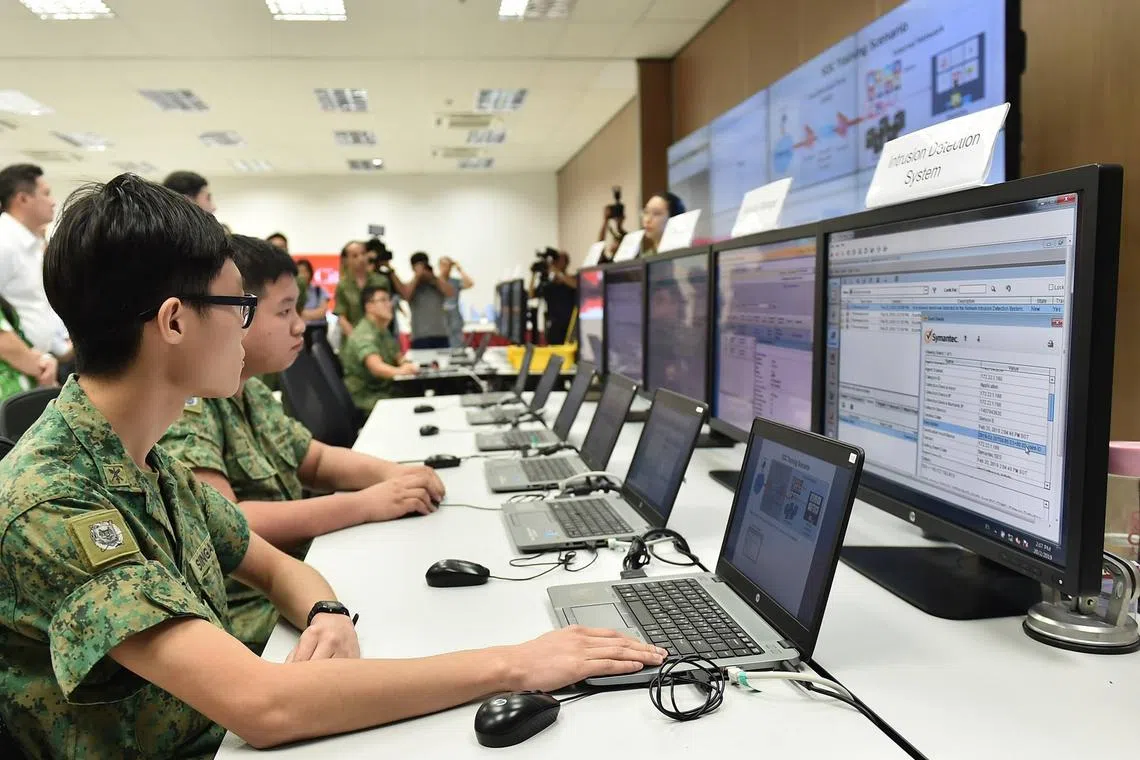SAF to equip more students with cyber-security skills in aid of national digital defence
Sign up now: Get ST's newsletters delivered to your inbox

Digital defence was introduced as the sixth pillar of Total Defence in 2019 to increase awareness of defence in the digital domain.
PHOTO: MINDEF
Follow topic:
SINGAPORE – A programme meant to equip young people with digital and cyber-security skills that was piloted in 2022 will be expanded and offered to more students in the coming years.
The Sentinel Programme run by the Digital and Intelligence Service – the fourth and newest branch of the Singapore Armed Forces (SAF)
Regionally, more is being done on the cyber-security front, said Senior Minister of State for Defence Heng Chee How. For instance, Singapore is working to establish a physical facility at Changi Naval Base for the ADMM Cybersecurity and Information Centre of Excellence (ACICE). This is slated to be ready by the third quarter of 2023.
The establishment of the centre was approved at the 15th Asean Defence Ministers’ Meeting, or ADMM, in 2021.
Mr Zaqy and Mr Heng were speaking in Parliament on Monday during the Budget debate for the Ministry of Defence, responding to questions from MPs.
Mr Shawn Huang (Jurong GRC) wanted to know how Singapore is working with other countries to combat cyber attacks, while Mr Seah Kian Peng (Marine Parade GRC) and Ms Rachel Ong (West Coast GRC) asked about Mindef’s efforts in engaging youth on defence.
Mr Zaqy said: “The (Sentinel) programme was carefully crafted to expose students to foundational skills such as basic programming, cryptography, and network forensics.
“We received strong student interest in the pilot programme, and are working with other agencies, such as the Cyber Security Agency of Singapore, to offer the programme to students from all secondary schools, junior colleges, polytechnics and the Institute of Technical Education in the coming years.”
In a statement on Monday, Mindef said that more than 300 students from four secondary schools, 13 junior colleges and five polytechnics participated in the programme in 2022.
Mindef added that digital defence was introduced as the sixth pillar of Total Defence in 2019 to increase awareness of defence in the digital domain, in recognition of the increased potential of online threats to Singapore and Singaporeans.
It said Mindef and the SAF recognised the need to engage Singaporeans from a young age on the importance of digital defence, and that the Sentinel Programme is meant to equip youth with useful cyber-security and digital skills that can contribute to Singapore’s digital defence.
Elaborating on the role of ACICE, Mr Heng said: “This centre promotes research and information sharing among partner nations on emerging cyber-security and informational threats.
“ACICE has started sharing products with all partner nations. The construction of ACICE’s physical centre is also under way.”
ACICE was established in June 2021, against a backdrop of rapid digitalisation and increasing prevalence of cyber attacks, disinformation and misinformation, said Mindef on Monday.
It comprises three centres: the Cybersecurity Centre, the Information Centre, and the Research Centre.
The cyber-security and information centres facilitate the sharing of information between regional and international experts in these fields, Mindef added, while the research centre collaborates with think-tanks and academic institutes on longer-term research on the impact of developments in digital and information technologies on defence.
Mindef said that ACICE will also partner local and international experts to organise conferences, dialogues and consultations to raise collective knowledge and expertise in the domain.


